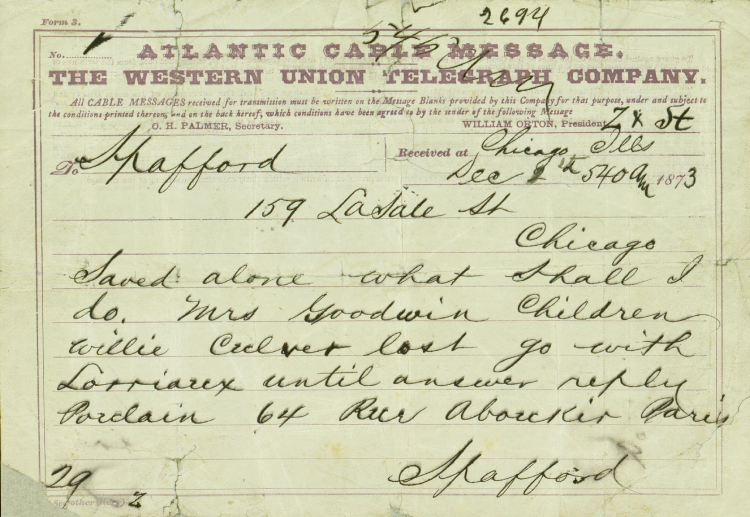
These were the words that Horatio Spafford received when he lost his children in a tragic shipwreck as his family was sailing for Europe on vacation. He was supposed to be with them but business caused Spafford to have to return home before they boarded the ship. He had his family go ahead and told them he would come as soon as the business was finished. Before he could leave America, this telegram arrived, and there was nothing he could do.
Anchored in the Storm: Horatio Spafford’s Unyielding Faith
Imagine a bustling Chicago street in the 1860s, where horse-drawn carriages clatter over cobblestones and towering buildings pierce the sky. Here thrives Horatio Spafford, a sharp-minded lawyer with a heart ablaze for Christ. He builds a prosperous life—vast properties, a loving wife named Anna, and five lively children who fill their home with laughter and prayers. Horatio and Anna open their doors wide, welcoming travelers and supporting evangelists like Dwight Moody. Their faith pulses strong, rooted in Scripture’s promises.
But storms gather swiftly. In 1870, scarlet fever strikes like a thief in the night, snatching their young son Horatio Jr. Grief crashes over them, yet they cling to hope. As the apostle Paul declares in 2 Corinthians 4:8-9 (ESV): “We are afflicted in every way, but not crushed; perplexed, but not driven to despair; persecuted, but not forsaken; struck down, but not destroyed.” Horatio presses on, channeling sorrow into service.
Then, flames roar through Chicago in 1871. The Great Fire devours the city, turning Horatio’s investments into smoldering ruins. Black smoke chokes the air; families flee with nothing but ashes clinging to their clothes. Horatio’s wealth vanishes, but his spirit ignites. He rallies aid for the homeless, distributing food and blankets amid the wreckage. In this trial, he echoes Job’s resolve: “Though he slay me, I will hope in him” (Job 13:15, ESV). Adversity forges his faith deeper, teaching him that true riches lie in eternal treasures.
Exhaustion weighed heavily by 1873. Horatio plans a restorative voyage to England, joining Moody’s revival meetings. Business snares him in Chicago, so Anna and their four daughters—bright-eyed Annie, playful Maggie, tender Bessie, and tiny Tanetta—sail ahead on the majestic Ville du Havre. Ocean waves sparkle under the sun as the ship glides eastward, carrying dreams of renewal.
Disaster strikes without mercy. In the dead of night, another vessel rams the Ville du Havre. Timbers splinter; screams pierce the darkness. The liner plunges into the Atlantic’s icy grip within minutes. Chaos reigns—passengers scramble for lifeboats, waves swallow the desperate. Two hundred twenty-six souls perish, including Horatio’s precious daughters. Anna, battered and clinging to debris, survives by miracle. From a rescue ship, she cables two shattering words: “Saved alone.”
News hits Horatio like a thunderbolt. He boards the next vessel, sailing toward his broken wife. As the ship nears the tragedy’s site, the captain summons him. “This marks the spot,” he says. The vast ocean stretches endlessly, hiding graves below. Horatio stands at the rail, wind whipping his face, heart pounding. Sorrows roll like sea billows, yet peace floods his soul. Inspired, he pens words that defy despair: a hymn declaring wellness amid wreckage.
Philip Bliss, a gifted composer, later set these lyrics to music, crafting a melody that soars with solemn power. Named “Ville du Havre,” it honors the lost ship while proclaiming victory. The hymn’s verses build like rising tides—from earthly peace to sin’s defeat at the cross, culminating in Christ’s triumphant return. As Colossians 2:13-14 (ESV) affirms: “And you, who were dead in your trespasses and the uncircumcision of your flesh, God made alive together with him, having forgiven us all our trespasses, by canceling the record of debt that stood against us with its legal demands. This he set aside, nailing it to the cross.”
More trials assail the Spaffords. They welcome three more children, but scarlet fever claims their second son in 1880. Undeterred, they uproot to Jerusalem in 1881, founding a community that shelters the needy—Jews, Muslims, Christians alike. Horatio tends the sick, feeds the hungry, and embodies Christ’s love until malaria claims him in 1888. Anna carries the torch, her faith unquenched until 1923.
Horatio’s story shouts encouragement: Storms rage, but faith anchors us. When fires consume dreams, when waves drown joys, God remains sovereign. Isaiah 43:2 (ESV) promises: “When you pass through the waters, I will be with you; and through the rivers, they shall not overwhelm you; when you walk through fire, you shall not be burned, and the flame shall not consume you.” Like Horatio, we can declare peace in chaos, for Christ has overcome.
Let this hymn become your lifeline—sing it daily, etch its truth into your heart. In every trial, prioritize “It Is Well with My Soul” as your battle cry. Feel the waves crash, yet stand firm; watch sorrows billow, yet soul-soar in grace. Embrace it now—your eternal wellness demands nothing less. Christ calls: Will you answer?
